Health Promotion Theories and Public Policy: A Detailed Report
VerifiedAdded on 2023/06/14
|7
|2230
|240
Report
AI Summary
This report provides an overview of health promotion theories and their application in public policy, focusing on the prevention of respiratory diseases. It discusses various health promotion models, including the medical model, behavioral change model, educational approach, client-centered approach, and societal change model, evaluating their effectiveness in promoting health and preventing chronic diseases. The report highlights the importance of public policies, such as anti-smoking laws, in fostering a healthier society. It concludes that a combination of health promotion theories and effective public policies is essential for improving public health and reducing the risk of chronic diseases.
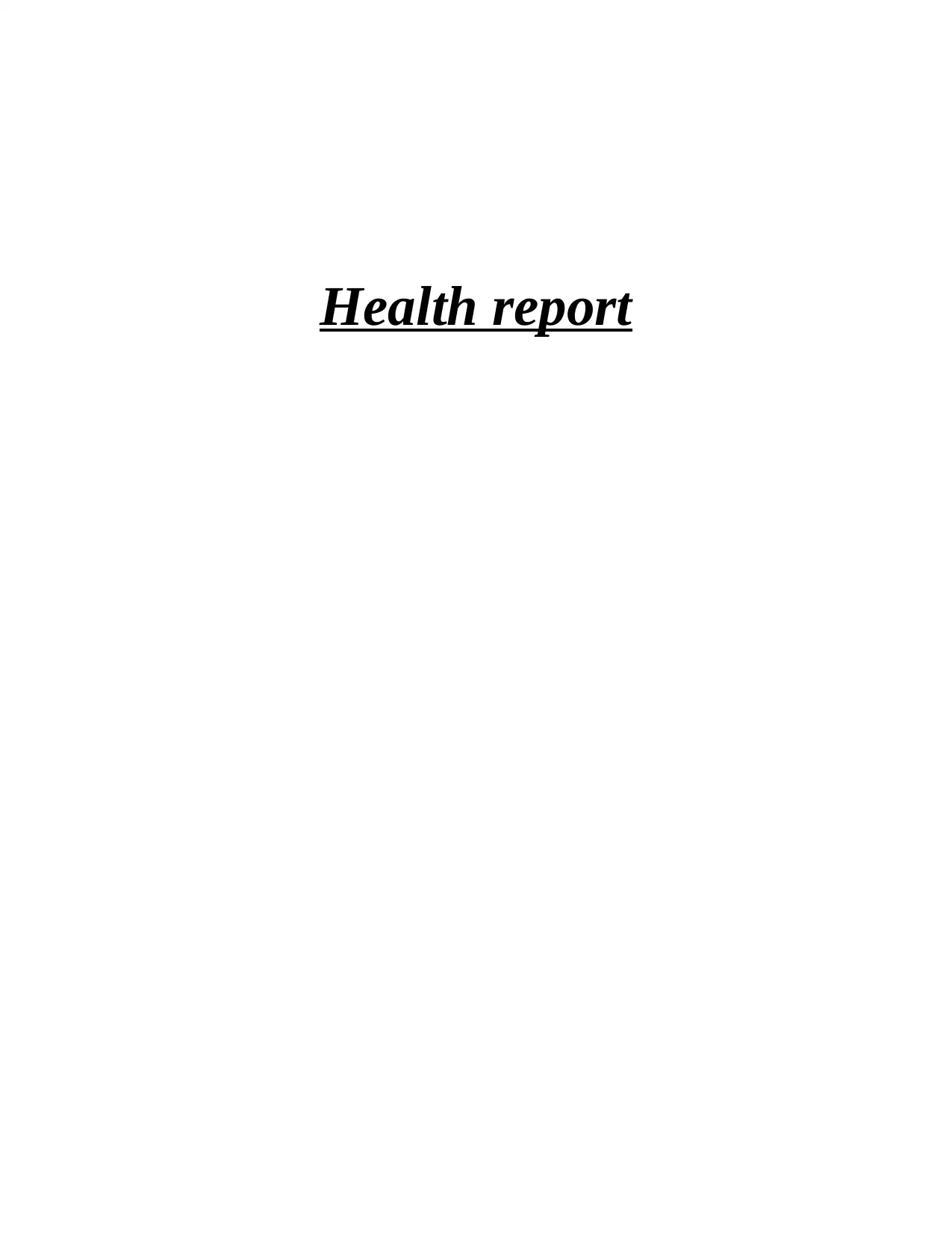
Health report
Paraphrase This Document
Need a fresh take? Get an instant paraphrase of this document with our AI Paraphraser
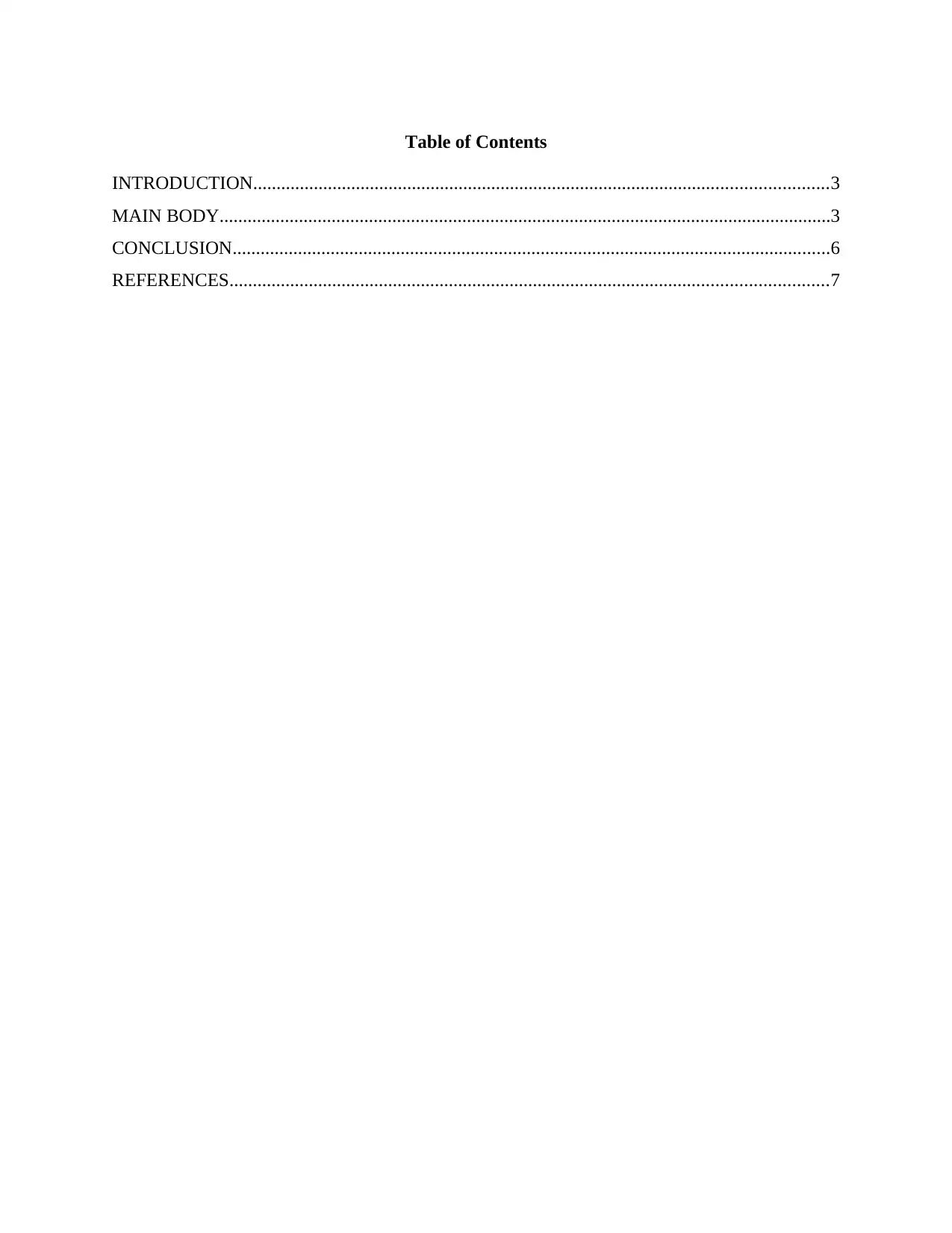
Table of Contents
INTRODUCTION...........................................................................................................................3
MAIN BODY...................................................................................................................................3
CONCLUSION................................................................................................................................6
REFERENCES................................................................................................................................7
INTRODUCTION...........................................................................................................................3
MAIN BODY...................................................................................................................................3
CONCLUSION................................................................................................................................6
REFERENCES................................................................................................................................7
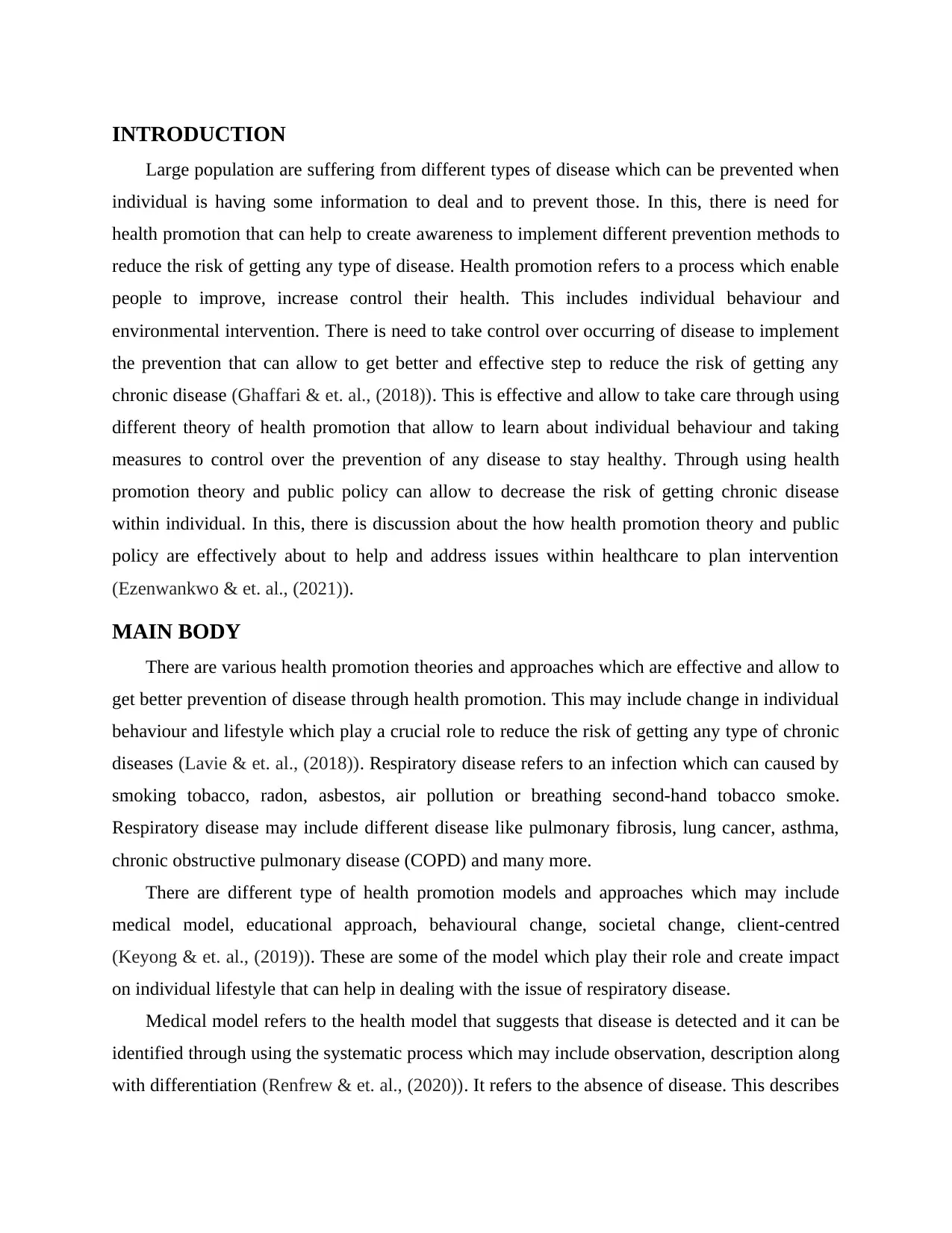
INTRODUCTION
Large population are suffering from different types of disease which can be prevented when
individual is having some information to deal and to prevent those. In this, there is need for
health promotion that can help to create awareness to implement different prevention methods to
reduce the risk of getting any type of disease. Health promotion refers to a process which enable
people to improve, increase control their health. This includes individual behaviour and
environmental intervention. There is need to take control over occurring of disease to implement
the prevention that can allow to get better and effective step to reduce the risk of getting any
chronic disease (Ghaffari & et. al., (2018)). This is effective and allow to take care through using
different theory of health promotion that allow to learn about individual behaviour and taking
measures to control over the prevention of any disease to stay healthy. Through using health
promotion theory and public policy can allow to decrease the risk of getting chronic disease
within individual. In this, there is discussion about the how health promotion theory and public
policy are effectively about to help and address issues within healthcare to plan intervention
(Ezenwankwo & et. al., (2021)).
MAIN BODY
There are various health promotion theories and approaches which are effective and allow to
get better prevention of disease through health promotion. This may include change in individual
behaviour and lifestyle which play a crucial role to reduce the risk of getting any type of chronic
diseases (Lavie & et. al., (2018)). Respiratory disease refers to an infection which can caused by
smoking tobacco, radon, asbestos, air pollution or breathing second-hand tobacco smoke.
Respiratory disease may include different disease like pulmonary fibrosis, lung cancer, asthma,
chronic obstructive pulmonary disease (COPD) and many more.
There are different type of health promotion models and approaches which may include
medical model, educational approach, behavioural change, societal change, client-centred
(Keyong & et. al., (2019)). These are some of the model which play their role and create impact
on individual lifestyle that can help in dealing with the issue of respiratory disease.
Medical model refers to the health model that suggests that disease is detected and it can be
identified through using the systematic process which may include observation, description along
with differentiation (Renfrew & et. al., (2020)). It refers to the absence of disease. This describes
Large population are suffering from different types of disease which can be prevented when
individual is having some information to deal and to prevent those. In this, there is need for
health promotion that can help to create awareness to implement different prevention methods to
reduce the risk of getting any type of disease. Health promotion refers to a process which enable
people to improve, increase control their health. This includes individual behaviour and
environmental intervention. There is need to take control over occurring of disease to implement
the prevention that can allow to get better and effective step to reduce the risk of getting any
chronic disease (Ghaffari & et. al., (2018)). This is effective and allow to take care through using
different theory of health promotion that allow to learn about individual behaviour and taking
measures to control over the prevention of any disease to stay healthy. Through using health
promotion theory and public policy can allow to decrease the risk of getting chronic disease
within individual. In this, there is discussion about the how health promotion theory and public
policy are effectively about to help and address issues within healthcare to plan intervention
(Ezenwankwo & et. al., (2021)).
MAIN BODY
There are various health promotion theories and approaches which are effective and allow to
get better prevention of disease through health promotion. This may include change in individual
behaviour and lifestyle which play a crucial role to reduce the risk of getting any type of chronic
diseases (Lavie & et. al., (2018)). Respiratory disease refers to an infection which can caused by
smoking tobacco, radon, asbestos, air pollution or breathing second-hand tobacco smoke.
Respiratory disease may include different disease like pulmonary fibrosis, lung cancer, asthma,
chronic obstructive pulmonary disease (COPD) and many more.
There are different type of health promotion models and approaches which may include
medical model, educational approach, behavioural change, societal change, client-centred
(Keyong & et. al., (2019)). These are some of the model which play their role and create impact
on individual lifestyle that can help in dealing with the issue of respiratory disease.
Medical model refers to the health model that suggests that disease is detected and it can be
identified through using the systematic process which may include observation, description along
with differentiation (Renfrew & et. al., (2020)). It refers to the absence of disease. This describes
⊘ This is a preview!⊘
Do you want full access?
Subscribe today to unlock all pages.

Trusted by 1+ million students worldwide
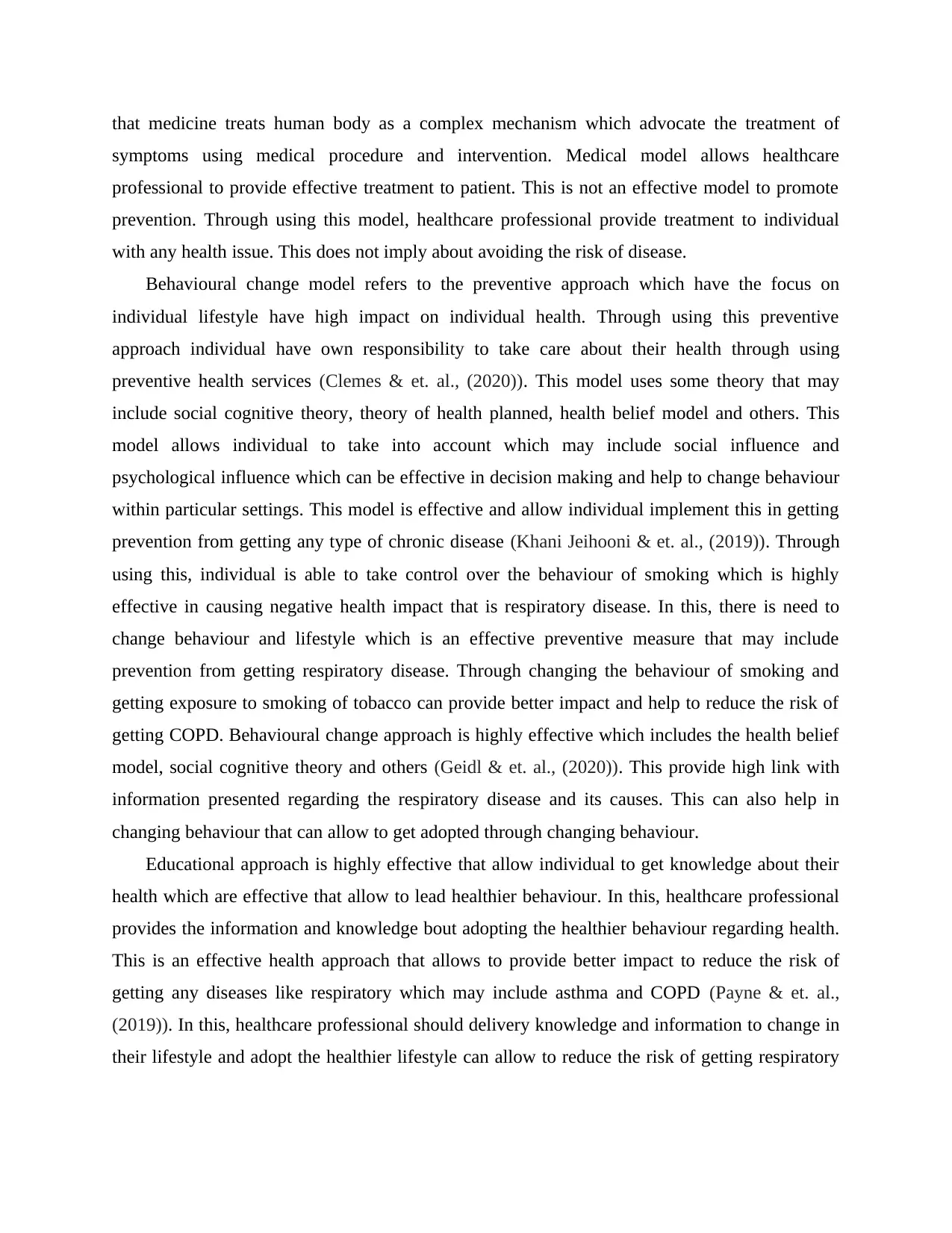
that medicine treats human body as a complex mechanism which advocate the treatment of
symptoms using medical procedure and intervention. Medical model allows healthcare
professional to provide effective treatment to patient. This is not an effective model to promote
prevention. Through using this model, healthcare professional provide treatment to individual
with any health issue. This does not imply about avoiding the risk of disease.
Behavioural change model refers to the preventive approach which have the focus on
individual lifestyle have high impact on individual health. Through using this preventive
approach individual have own responsibility to take care about their health through using
preventive health services (Clemes & et. al., (2020)). This model uses some theory that may
include social cognitive theory, theory of health planned, health belief model and others. This
model allows individual to take into account which may include social influence and
psychological influence which can be effective in decision making and help to change behaviour
within particular settings. This model is effective and allow individual implement this in getting
prevention from getting any type of chronic disease (Khani Jeihooni & et. al., (2019)). Through
using this, individual is able to take control over the behaviour of smoking which is highly
effective in causing negative health impact that is respiratory disease. In this, there is need to
change behaviour and lifestyle which is an effective preventive measure that may include
prevention from getting respiratory disease. Through changing the behaviour of smoking and
getting exposure to smoking of tobacco can provide better impact and help to reduce the risk of
getting COPD. Behavioural change approach is highly effective which includes the health belief
model, social cognitive theory and others (Geidl & et. al., (2020)). This provide high link with
information presented regarding the respiratory disease and its causes. This can also help in
changing behaviour that can allow to get adopted through changing behaviour.
Educational approach is highly effective that allow individual to get knowledge about their
health which are effective that allow to lead healthier behaviour. In this, healthcare professional
provides the information and knowledge bout adopting the healthier behaviour regarding health.
This is an effective health approach that allows to provide better impact to reduce the risk of
getting any diseases like respiratory which may include asthma and COPD (Payne & et. al.,
(2019)). In this, healthcare professional should delivery knowledge and information to change in
their lifestyle and adopt the healthier lifestyle can allow to reduce the risk of getting respiratory
symptoms using medical procedure and intervention. Medical model allows healthcare
professional to provide effective treatment to patient. This is not an effective model to promote
prevention. Through using this model, healthcare professional provide treatment to individual
with any health issue. This does not imply about avoiding the risk of disease.
Behavioural change model refers to the preventive approach which have the focus on
individual lifestyle have high impact on individual health. Through using this preventive
approach individual have own responsibility to take care about their health through using
preventive health services (Clemes & et. al., (2020)). This model uses some theory that may
include social cognitive theory, theory of health planned, health belief model and others. This
model allows individual to take into account which may include social influence and
psychological influence which can be effective in decision making and help to change behaviour
within particular settings. This model is effective and allow individual implement this in getting
prevention from getting any type of chronic disease (Khani Jeihooni & et. al., (2019)). Through
using this, individual is able to take control over the behaviour of smoking which is highly
effective in causing negative health impact that is respiratory disease. In this, there is need to
change behaviour and lifestyle which is an effective preventive measure that may include
prevention from getting respiratory disease. Through changing the behaviour of smoking and
getting exposure to smoking of tobacco can provide better impact and help to reduce the risk of
getting COPD. Behavioural change approach is highly effective which includes the health belief
model, social cognitive theory and others (Geidl & et. al., (2020)). This provide high link with
information presented regarding the respiratory disease and its causes. This can also help in
changing behaviour that can allow to get adopted through changing behaviour.
Educational approach is highly effective that allow individual to get knowledge about their
health which are effective that allow to lead healthier behaviour. In this, healthcare professional
provides the information and knowledge bout adopting the healthier behaviour regarding health.
This is an effective health approach that allows to provide better impact to reduce the risk of
getting any diseases like respiratory which may include asthma and COPD (Payne & et. al.,
(2019)). In this, healthcare professional should delivery knowledge and information to change in
their lifestyle and adopt the healthier lifestyle can allow to reduce the risk of getting respiratory
Paraphrase This Document
Need a fresh take? Get an instant paraphrase of this document with our AI Paraphraser
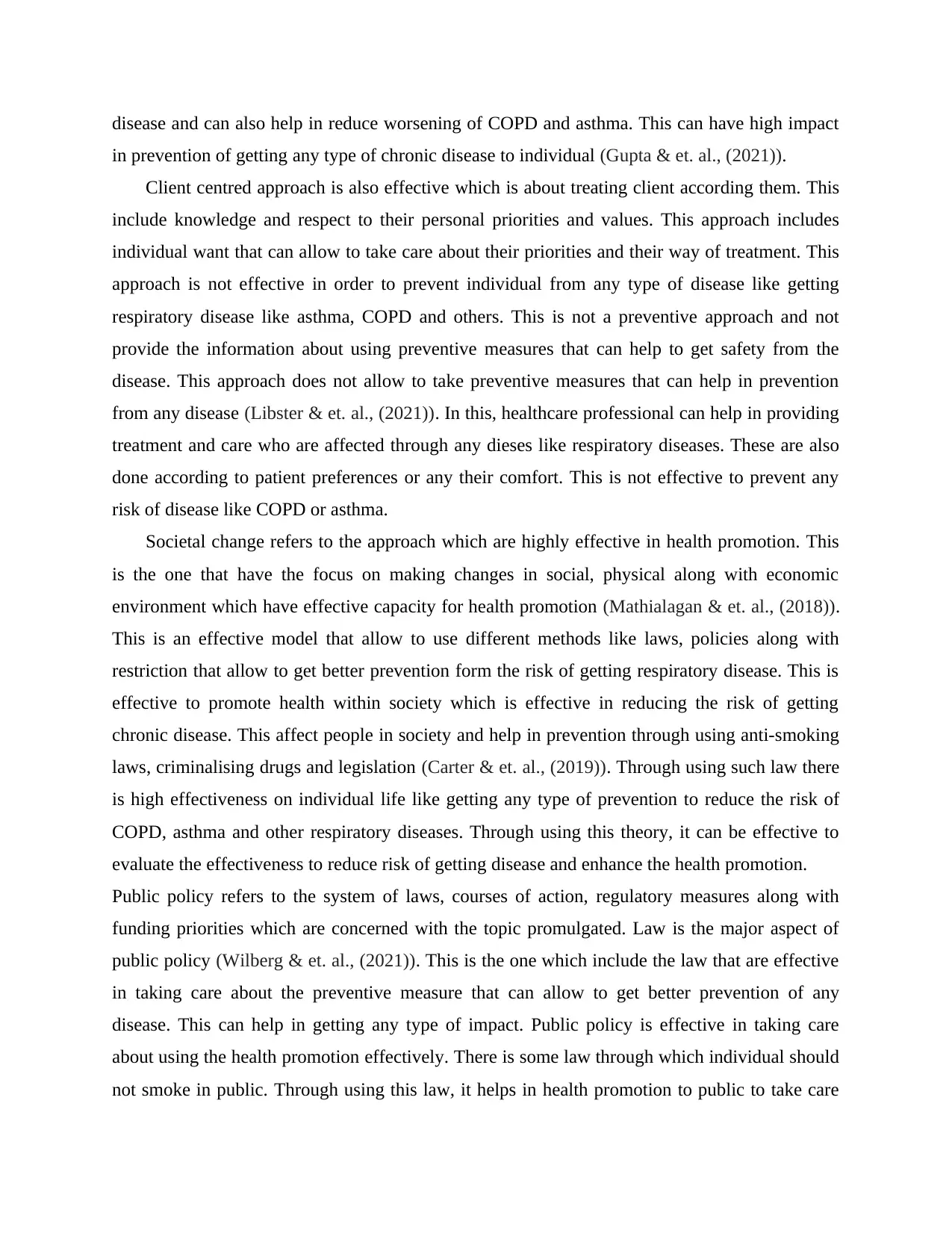
disease and can also help in reduce worsening of COPD and asthma. This can have high impact
in prevention of getting any type of chronic disease to individual (Gupta & et. al., (2021)).
Client centred approach is also effective which is about treating client according them. This
include knowledge and respect to their personal priorities and values. This approach includes
individual want that can allow to take care about their priorities and their way of treatment. This
approach is not effective in order to prevent individual from any type of disease like getting
respiratory disease like asthma, COPD and others. This is not a preventive approach and not
provide the information about using preventive measures that can help to get safety from the
disease. This approach does not allow to take preventive measures that can help in prevention
from any disease (Libster & et. al., (2021)). In this, healthcare professional can help in providing
treatment and care who are affected through any dieses like respiratory diseases. These are also
done according to patient preferences or any their comfort. This is not effective to prevent any
risk of disease like COPD or asthma.
Societal change refers to the approach which are highly effective in health promotion. This
is the one that have the focus on making changes in social, physical along with economic
environment which have effective capacity for health promotion (Mathialagan & et. al., (2018)).
This is an effective model that allow to use different methods like laws, policies along with
restriction that allow to get better prevention form the risk of getting respiratory disease. This is
effective to promote health within society which is effective in reducing the risk of getting
chronic disease. This affect people in society and help in prevention through using anti-smoking
laws, criminalising drugs and legislation (Carter & et. al., (2019)). Through using such law there
is high effectiveness on individual life like getting any type of prevention to reduce the risk of
COPD, asthma and other respiratory diseases. Through using this theory, it can be effective to
evaluate the effectiveness to reduce risk of getting disease and enhance the health promotion.
Public policy refers to the system of laws, courses of action, regulatory measures along with
funding priorities which are concerned with the topic promulgated. Law is the major aspect of
public policy (Wilberg & et. al., (2021)). This is the one which include the law that are effective
in taking care about the preventive measure that can allow to get better prevention of any
disease. This can help in getting any type of impact. Public policy is effective in taking care
about using the health promotion effectively. There is some law through which individual should
not smoke in public. Through using this law, it helps in health promotion to public to take care
in prevention of getting any type of chronic disease to individual (Gupta & et. al., (2021)).
Client centred approach is also effective which is about treating client according them. This
include knowledge and respect to their personal priorities and values. This approach includes
individual want that can allow to take care about their priorities and their way of treatment. This
approach is not effective in order to prevent individual from any type of disease like getting
respiratory disease like asthma, COPD and others. This is not a preventive approach and not
provide the information about using preventive measures that can help to get safety from the
disease. This approach does not allow to take preventive measures that can help in prevention
from any disease (Libster & et. al., (2021)). In this, healthcare professional can help in providing
treatment and care who are affected through any dieses like respiratory diseases. These are also
done according to patient preferences or any their comfort. This is not effective to prevent any
risk of disease like COPD or asthma.
Societal change refers to the approach which are highly effective in health promotion. This
is the one that have the focus on making changes in social, physical along with economic
environment which have effective capacity for health promotion (Mathialagan & et. al., (2018)).
This is an effective model that allow to use different methods like laws, policies along with
restriction that allow to get better prevention form the risk of getting respiratory disease. This is
effective to promote health within society which is effective in reducing the risk of getting
chronic disease. This affect people in society and help in prevention through using anti-smoking
laws, criminalising drugs and legislation (Carter & et. al., (2019)). Through using such law there
is high effectiveness on individual life like getting any type of prevention to reduce the risk of
COPD, asthma and other respiratory diseases. Through using this theory, it can be effective to
evaluate the effectiveness to reduce risk of getting disease and enhance the health promotion.
Public policy refers to the system of laws, courses of action, regulatory measures along with
funding priorities which are concerned with the topic promulgated. Law is the major aspect of
public policy (Wilberg & et. al., (2021)). This is the one which include the law that are effective
in taking care about the preventive measure that can allow to get better prevention of any
disease. This can help in getting any type of impact. Public policy is effective in taking care
about using the health promotion effectively. There is some law through which individual should
not smoke in public. Through using this law, it helps in health promotion to public to take care
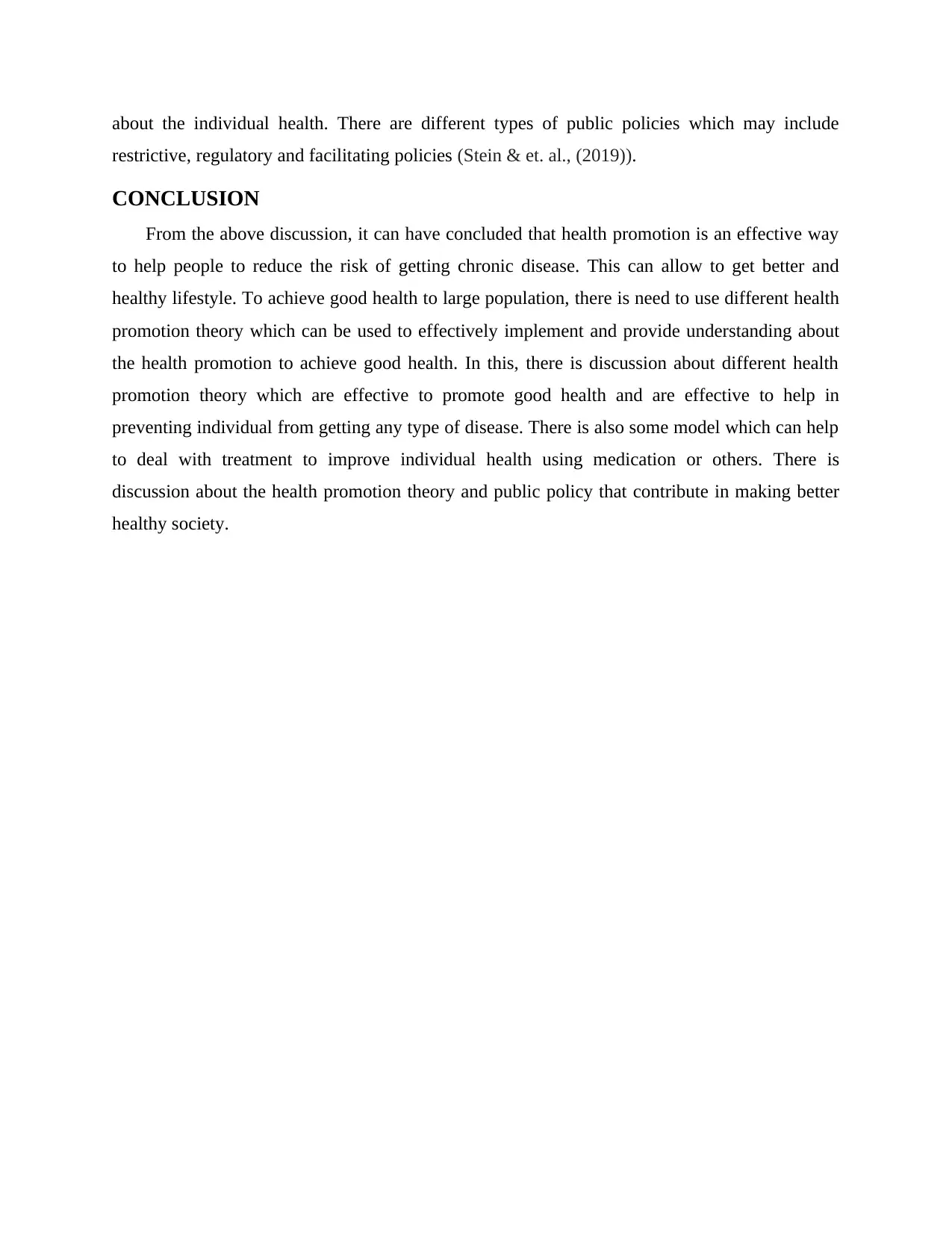
about the individual health. There are different types of public policies which may include
restrictive, regulatory and facilitating policies (Stein & et. al., (2019)).
CONCLUSION
From the above discussion, it can have concluded that health promotion is an effective way
to help people to reduce the risk of getting chronic disease. This can allow to get better and
healthy lifestyle. To achieve good health to large population, there is need to use different health
promotion theory which can be used to effectively implement and provide understanding about
the health promotion to achieve good health. In this, there is discussion about different health
promotion theory which are effective to promote good health and are effective to help in
preventing individual from getting any type of disease. There is also some model which can help
to deal with treatment to improve individual health using medication or others. There is
discussion about the health promotion theory and public policy that contribute in making better
healthy society.
restrictive, regulatory and facilitating policies (Stein & et. al., (2019)).
CONCLUSION
From the above discussion, it can have concluded that health promotion is an effective way
to help people to reduce the risk of getting chronic disease. This can allow to get better and
healthy lifestyle. To achieve good health to large population, there is need to use different health
promotion theory which can be used to effectively implement and provide understanding about
the health promotion to achieve good health. In this, there is discussion about different health
promotion theory which are effective to promote good health and are effective to help in
preventing individual from getting any type of disease. There is also some model which can help
to deal with treatment to improve individual health using medication or others. There is
discussion about the health promotion theory and public policy that contribute in making better
healthy society.
⊘ This is a preview!⊘
Do you want full access?
Subscribe today to unlock all pages.

Trusted by 1+ million students worldwide
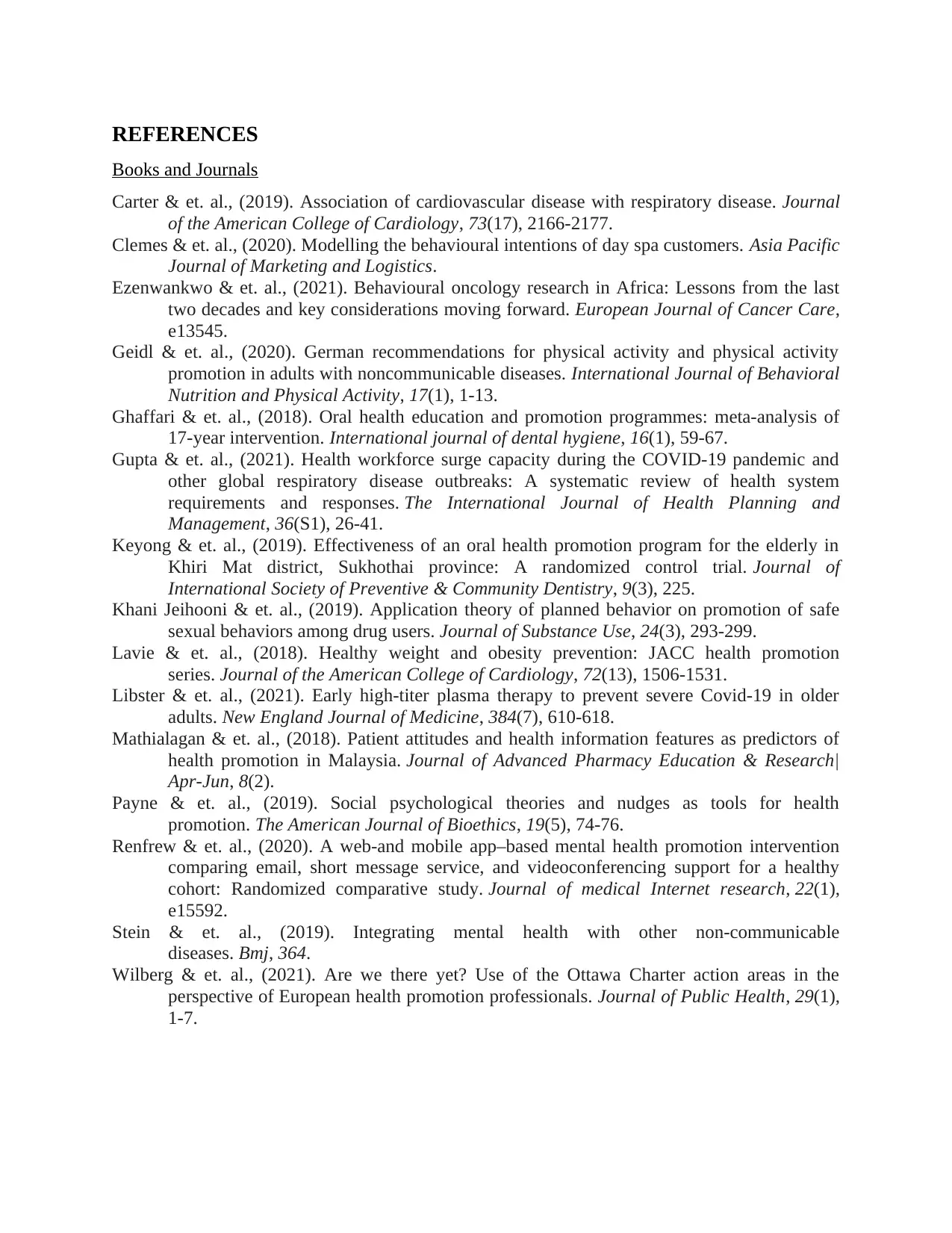
REFERENCES
Books and Journals
Carter & et. al., (2019). Association of cardiovascular disease with respiratory disease. Journal
of the American College of Cardiology, 73(17), 2166-2177.
Clemes & et. al., (2020). Modelling the behavioural intentions of day spa customers. Asia Pacific
Journal of Marketing and Logistics.
Ezenwankwo & et. al., (2021). Behavioural oncology research in Africa: Lessons from the last
two decades and key considerations moving forward. European Journal of Cancer Care,
e13545.
Geidl & et. al., (2020). German recommendations for physical activity and physical activity
promotion in adults with noncommunicable diseases. International Journal of Behavioral
Nutrition and Physical Activity, 17(1), 1-13.
Ghaffari & et. al., (2018). Oral health education and promotion programmes: meta‐analysis of
17‐year intervention. International journal of dental hygiene, 16(1), 59-67.
Gupta & et. al., (2021). Health workforce surge capacity during the COVID‐19 pandemic and
other global respiratory disease outbreaks: A systematic review of health system
requirements and responses. The International Journal of Health Planning and
Management, 36(S1), 26-41.
Keyong & et. al., (2019). Effectiveness of an oral health promotion program for the elderly in
Khiri Mat district, Sukhothai province: A randomized control trial. Journal of
International Society of Preventive & Community Dentistry, 9(3), 225.
Khani Jeihooni & et. al., (2019). Application theory of planned behavior on promotion of safe
sexual behaviors among drug users. Journal of Substance Use, 24(3), 293-299.
Lavie & et. al., (2018). Healthy weight and obesity prevention: JACC health promotion
series. Journal of the American College of Cardiology, 72(13), 1506-1531.
Libster & et. al., (2021). Early high-titer plasma therapy to prevent severe Covid-19 in older
adults. New England Journal of Medicine, 384(7), 610-618.
Mathialagan & et. al., (2018). Patient attitudes and health information features as predictors of
health promotion in Malaysia. Journal of Advanced Pharmacy Education & Research|
Apr-Jun, 8(2).
Payne & et. al., (2019). Social psychological theories and nudges as tools for health
promotion. The American Journal of Bioethics, 19(5), 74-76.
Renfrew & et. al., (2020). A web-and mobile app–based mental health promotion intervention
comparing email, short message service, and videoconferencing support for a healthy
cohort: Randomized comparative study. Journal of medical Internet research, 22(1),
e15592.
Stein & et. al., (2019). Integrating mental health with other non-communicable
diseases. Bmj, 364.
Wilberg & et. al., (2021). Are we there yet? Use of the Ottawa Charter action areas in the
perspective of European health promotion professionals. Journal of Public Health, 29(1),
1-7.
Books and Journals
Carter & et. al., (2019). Association of cardiovascular disease with respiratory disease. Journal
of the American College of Cardiology, 73(17), 2166-2177.
Clemes & et. al., (2020). Modelling the behavioural intentions of day spa customers. Asia Pacific
Journal of Marketing and Logistics.
Ezenwankwo & et. al., (2021). Behavioural oncology research in Africa: Lessons from the last
two decades and key considerations moving forward. European Journal of Cancer Care,
e13545.
Geidl & et. al., (2020). German recommendations for physical activity and physical activity
promotion in adults with noncommunicable diseases. International Journal of Behavioral
Nutrition and Physical Activity, 17(1), 1-13.
Ghaffari & et. al., (2018). Oral health education and promotion programmes: meta‐analysis of
17‐year intervention. International journal of dental hygiene, 16(1), 59-67.
Gupta & et. al., (2021). Health workforce surge capacity during the COVID‐19 pandemic and
other global respiratory disease outbreaks: A systematic review of health system
requirements and responses. The International Journal of Health Planning and
Management, 36(S1), 26-41.
Keyong & et. al., (2019). Effectiveness of an oral health promotion program for the elderly in
Khiri Mat district, Sukhothai province: A randomized control trial. Journal of
International Society of Preventive & Community Dentistry, 9(3), 225.
Khani Jeihooni & et. al., (2019). Application theory of planned behavior on promotion of safe
sexual behaviors among drug users. Journal of Substance Use, 24(3), 293-299.
Lavie & et. al., (2018). Healthy weight and obesity prevention: JACC health promotion
series. Journal of the American College of Cardiology, 72(13), 1506-1531.
Libster & et. al., (2021). Early high-titer plasma therapy to prevent severe Covid-19 in older
adults. New England Journal of Medicine, 384(7), 610-618.
Mathialagan & et. al., (2018). Patient attitudes and health information features as predictors of
health promotion in Malaysia. Journal of Advanced Pharmacy Education & Research|
Apr-Jun, 8(2).
Payne & et. al., (2019). Social psychological theories and nudges as tools for health
promotion. The American Journal of Bioethics, 19(5), 74-76.
Renfrew & et. al., (2020). A web-and mobile app–based mental health promotion intervention
comparing email, short message service, and videoconferencing support for a healthy
cohort: Randomized comparative study. Journal of medical Internet research, 22(1),
e15592.
Stein & et. al., (2019). Integrating mental health with other non-communicable
diseases. Bmj, 364.
Wilberg & et. al., (2021). Are we there yet? Use of the Ottawa Charter action areas in the
perspective of European health promotion professionals. Journal of Public Health, 29(1),
1-7.
1 out of 7
Related Documents
Your All-in-One AI-Powered Toolkit for Academic Success.
+13062052269
info@desklib.com
Available 24*7 on WhatsApp / Email
![[object Object]](/_next/static/media/star-bottom.7253800d.svg)
Unlock your academic potential
Copyright © 2020–2025 A2Z Services. All Rights Reserved. Developed and managed by ZUCOL.





